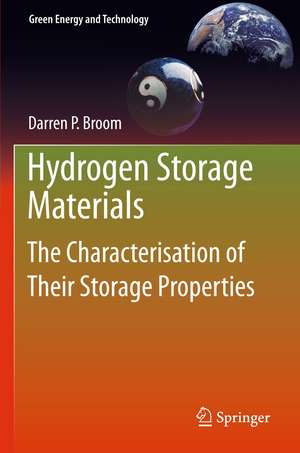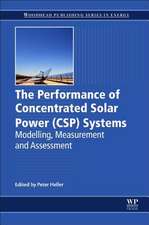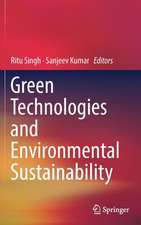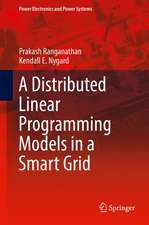Hydrogen Storage Materials: The Characterisation of Their Storage Properties: Green Energy and Technology
Autor Darren P. Broomen Limba Engleză Paperback – 21 apr 2013
The background to the topic is introduced, along with the various types of materials that are currently under investigation, including nanostructured interstitial and complex hydrides, and porous materials, such as metal-organic frameworks and microporous organic polymers. The main features of Hydrogen Storage Materials include:
- an overview of the different types of hydrogen storage materials and the properties that are of interest for their practical use;
- descriptions of the gas sorption measurement methods used to determine these properties, and the complementary techniques that can be used to help corroborate hydrogen uptake data; and
- extensive coverage of the practical considerations for accurate hydrogen sorption measurement that drive both instrument design and the development of experimental methodology.
| Toate formatele și edițiile | Preț | Express |
|---|---|---|
| Paperback (1) | 943.43 lei 43-57 zile | |
| SPRINGER LONDON – 21 apr 2013 | 943.43 lei 43-57 zile | |
| Hardback (1) | 948.16 lei 43-57 zile | |
| SPRINGER LONDON – 2 mar 2011 | 948.16 lei 43-57 zile |
Din seria Green Energy and Technology
- 18%
 Preț: 943.43 lei
Preț: 943.43 lei - 20%
 Preț: 629.52 lei
Preț: 629.52 lei - 18%
 Preț: 1124.92 lei
Preț: 1124.92 lei - 18%
 Preț: 947.35 lei
Preț: 947.35 lei - 15%
 Preț: 655.92 lei
Preț: 655.92 lei - 18%
 Preț: 957.62 lei
Preț: 957.62 lei - 18%
 Preț: 789.52 lei
Preț: 789.52 lei - 17%
 Preț: 464.55 lei
Preț: 464.55 lei - 15%
 Preț: 645.79 lei
Preț: 645.79 lei - 18%
 Preț: 903.93 lei
Preț: 903.93 lei - 24%
 Preț: 1322.07 lei
Preț: 1322.07 lei - 18%
 Preț: 890.54 lei
Preț: 890.54 lei - 18%
 Preț: 1115.46 lei
Preț: 1115.46 lei - 18%
 Preț: 1117.03 lei
Preț: 1117.03 lei - 18%
 Preț: 949.73 lei
Preț: 949.73 lei - 18%
 Preț: 892.11 lei
Preț: 892.11 lei - 15%
 Preț: 648.24 lei
Preț: 648.24 lei - 18%
 Preț: 997.09 lei
Preț: 997.09 lei - 15%
 Preț: 579.81 lei
Preț: 579.81 lei - 18%
 Preț: 1123.15 lei
Preț: 1123.15 lei - 18%
 Preț: 961.41 lei
Preț: 961.41 lei - 17%
 Preț: 490.22 lei
Preț: 490.22 lei - 18%
 Preț: 904.60 lei
Preț: 904.60 lei - 15%
 Preț: 643.34 lei
Preț: 643.34 lei -
 Preț: 287.90 lei
Preț: 287.90 lei - 24%
 Preț: 634.04 lei
Preț: 634.04 lei -
 Preț: 379.39 lei
Preț: 379.39 lei - 18%
 Preț: 783.20 lei
Preț: 783.20 lei - 18%
 Preț: 1394.84 lei
Preț: 1394.84 lei - 18%
 Preț: 1691.57 lei
Preț: 1691.57 lei - 18%
 Preț: 1112.48 lei
Preț: 1112.48 lei - 15%
 Preț: 592.61 lei
Preț: 592.61 lei - 18%
 Preț: 952.09 lei
Preț: 952.09 lei - 18%
 Preț: 944.19 lei
Preț: 944.19 lei - 18%
 Preț: 891.33 lei
Preț: 891.33 lei - 18%
 Preț: 1252.44 lei
Preț: 1252.44 lei - 18%
 Preț: 789.52 lei
Preț: 789.52 lei - 20%
 Preț: 566.29 lei
Preț: 566.29 lei - 18%
 Preț: 1113.71 lei
Preț: 1113.71 lei - 18%
 Preț: 1114.24 lei
Preț: 1114.24 lei - 24%
 Preț: 590.58 lei
Preț: 590.58 lei - 20%
 Preț: 567.49 lei
Preț: 567.49 lei - 24%
 Preț: 907.48 lei
Preț: 907.48 lei - 18%
 Preț: 952.89 lei
Preț: 952.89 lei - 18%
 Preț: 952.89 lei
Preț: 952.89 lei - 18%
 Preț: 950.52 lei
Preț: 950.52 lei
Preț: 943.43 lei
Preț vechi: 1150.52 lei
-18% Nou
Puncte Express: 1415
Preț estimativ în valută:
180.52€ • 188.99$ • 149.37£
180.52€ • 188.99$ • 149.37£
Carte tipărită la comandă
Livrare economică 07-21 aprilie
Preluare comenzi: 021 569.72.76
Specificații
ISBN-13: 9781447126393
ISBN-10: 1447126394
Pagini: 272
Ilustrații: XII, 260 p.
Dimensiuni: 155 x 235 x 17 mm
Greutate: 0.39 kg
Ediția:2011
Editura: SPRINGER LONDON
Colecția Springer
Seria Green Energy and Technology
Locul publicării:London, United Kingdom
ISBN-10: 1447126394
Pagini: 272
Ilustrații: XII, 260 p.
Dimensiuni: 155 x 235 x 17 mm
Greutate: 0.39 kg
Ediția:2011
Editura: SPRINGER LONDON
Colecția Springer
Seria Green Energy and Technology
Locul publicării:London, United Kingdom
Public țintă
ResearchCuprins
1. Introduction.- 2. Potential Storage Materials.- 3. Hydrogen Sorption Properties of Materials.- 4. Gas Sorption Measurement Techniques.- 5. Complementary Characterisation Techniques.- 6. Experimental Considerations.- 7. Concluding Remarks.
Recenzii
“When compared with fossil fuels, hydrogen comes out on top in every comparison, except one. Hydrogen is the lightest fuel, the most efficient fuel and the cleanest fuel. However, for a given amount of energy, its storage is heavier and takes more volume, as compared with fluid fossil fuels, i.e., petroleum and natural gas. Hence, extensive R&D activities around the world are taking place in order to improve the gravimetric and volumetric storage properties of hydrogen. In this respect, Hydrogen Storage Materials offer the best promise. The book “Hydrogen Storage Materials: The Characterisation of Their Storage Properties” by Darren P. Broom admirably presents the latest knowledge and research results on this important topic. Consequently, I strongly recommend this book to hydrogen energy scientists and engineers in general, and to those involved in the storage of hydrogen in particular.”
T. Nejat Veziroglu, President of International Association for Hydrogen Energy
“The book contains an impressive number of useful and topical references, and a descriptive introductory chapter outlining the search for a viable solid state store…[It] provides a good overview of these developments which sets the scene for the subsequent chapters which concentrate in commendable detail on the measurement techniques… In summary therefore, the search for a viable, lightweight solid state hydrogen storage material continues and to aid this task, this book provides a very valuable addition to a researcher’s shelf.”
Rex Harris, International Journal of Hydrogen Energy, vol. 37, issue 9, 2012, p.7950-7951
T. Nejat Veziroglu, President of International Association for Hydrogen Energy
“The book contains an impressive number of useful and topical references, and a descriptive introductory chapter outlining the search for a viable solid state store…[It] provides a good overview of these developments which sets the scene for the subsequent chapters which concentrate in commendable detail on the measurement techniques… In summary therefore, the search for a viable, lightweight solid state hydrogen storage material continues and to aid this task, this book provides a very valuable addition to a researcher’s shelf.”
Rex Harris, International Journal of Hydrogen Energy, vol. 37, issue 9, 2012, p.7950-7951
Notă biografică
Darren Broom is currently a Product Manager for Hiden Isochema Ltd, a manufacturer of analytical gas and vapour sorption instrumentation. His principal responsibility is the HTP series of volumetric and thermal desorption hydrogen storage material analysers. He holds a PhD from the University of Salford's Institute for Materials Research and, on completing his doctorate, went on to work for the European Commission's Institute for Energy where he assisted in the development of their hydrogen storage material testing facility.
Textul de pe ultima copertă
The problem of storing hydrogen safely and effectively is one of the major technological barriers currently preventing the widespread adoption of hydrogen as an energy carrier and the subsequent transition to a so-called hydrogen economy. Practical issues with the storage of hydrogen in both gas and liquid form appear to make reversible solid state hydrogen storage the most promising potential solution. Hydrogen Storage Materials addresses the characterisation of the hydrogen storage properties of the materials that are currently being considered for this purpose.
The background to the topic is introduced, along with the various types of materials that are currently under investigation, including nanostructured interstitial and complex hydrides, and porous materials, such as metal-organic frameworks and microporous organic polymers. The main features of Hydrogen Storage Materials include:
The background to the topic is introduced, along with the various types of materials that are currently under investigation, including nanostructured interstitial and complex hydrides, and porous materials, such as metal-organic frameworks and microporous organic polymers. The main features of Hydrogen Storage Materials include:
- an overview of the different types of hydrogen storage materials and the properties that are of interest for their practical use;
- descriptions of the gas sorption measurement methods used to determine these properties, and the complementary techniques that can be used to help corroborate hydrogen uptake data; and
- extensive coverage of the practical considerations for accurate hydrogen sorption measurement that drive both instrument design and the development of experimental methodology.
Caracteristici
Offers an up-to-date overview of the topic for researchers Includes enough introductory material to be of use to newcomers to the field Provides extensive coverage of measurement error sources and other experimental considerations Includes supplementary material: sn.pub/extras


























